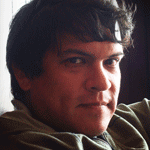
OK, I admit it. I couldn’t help but succumb to the temptation to write the protagonist in my first novel, White Rock, as a pseudo-extension of myself. In all fairness, I’m not sure ego had as much to do with my decision as much as honesty did. I know the complexity of my emotions and what triggers my rage, my insecurities, my darkest desires. Who else but I could approach this material with as much intelligence, wit, and irony? (It’s a joke, people…) But seriously, this novel easily could have been a train wreck right out of the gate. I wanted to not only create a character who embodied the eccentricities of my own personality, but also someone who wasn’t simply a one-dimensional superhero alter-ego either. In my mind, I saw a person who possessed not only the best but also the worst parts of my nature; someone hopelessly human, flawed to the core, insecure, fragile, and beaten down by a life that has taken everything they have ever loved away. No, as of this publication, I have not yet lost my parents, do not suffer from debilitating syndromes, and am not lost in the mesmerizing haze of mid-20s millennial life, but unless we have been sheltered or have made ourselves impenetrable to disaster by closing off our emotional responses, all of us have suffered some form of loss in our lives. I wanted to mirror the mortal coil in this character’s fight, both exterior and interior, to rise above the hard reality of life in her quest to overcome insurmountable opposition. That strength, that perseverance was what I wanted illustrated in my protagonist. So, maybe she’s not as much like me after all… However, she’s what I wish I could be in many respects.
I also took a chance that I don’t think many first-time male authors would by making my protagonist a female. I wanted to see if I could stay true to my vision of an anti-hero but in the persona of someone who also had to advance as a female in a male-dominated world, with all of the stereotypical misgivings and insecurities that modern Western life instigates on assertive, self-empowered women. As I said earlier, I didn’t want her to be a totally ‘Mary Sue’, the embodiment of a perfect fan-boy fantasy. Instead, I wanted her to be a figure that would help define what a modern woman could be, a possible role model for young women all over the world who are struggling to discover themselves. And to do this I had to overcome some of my own mental prejudices about the state of women and put myself into the character completely. Luckily, I have always had female friends and had a deep well from which to draw not only best but also the worst parts of the feminine experience. Now, that’s not to say I’m an expert by any means on the workings of the female mind. Yes, I made some presuppositions in Laura’s back-story that globally affect her choices and temperaments, but I approached the gender switch as Laura would; testing the waters at every step and adjusting to experiential knowledge that the character gathers along the way.
Surprisingly, from the initial feedback, it’s seems I’ve not only dodged a bullet but may have even succeeded in creating a viable and believable female heroine. One main reason I think this experiment worked is because I didn’t tie everything up neatly in a single package like I could have attempted. Laura Milton is a very complex woman, a sum of her experiences, not a totalitarian heroine who forces her beliefs upon society, but rather someone who submits the evidence and allows society to make up its own mind. Be it with her protective ex-partner Colin Jonahs or the myriad of characters she meets in Dallas, she stays passive in her approach yet is fully in control of her faculties and forces herself to stay as impartial as possible. Laura’s strength lies in her passivity, her allowance for conjecture, and her foundation of self-reliance that makes her conclusions, once they are presented, absolutely bullet-proof.
Laura’s last name, Milton, was a nod to the great English writer and epic poet John Milton, the author of the seminal work Paradise Lost. He wrote at a very tumultuous time in English history, a time plagued with political unrest and religious upheaval, very much like our modern day. His work reflected his deep convictions for freedom and self-determination, two of the intrinsic character traits that motivate Laura throughout her perilous journey of self-discovery. I wanted to hint that she is more than just the sum of her personal experiences, that, for a young modern American woman, she transcends her stereotype in many ways.
Although I gave Laura a certain amount of fiscal autonomy that not many people, male or female, are blessed with, I took some of the fundamental securities that most of us take for granted away from her. Her privilege is balanced with obvious liabilities; compromised health, personal insecurity, and a deep sense of longing and displacement. So to say I’ve made life easy for her is a complete misperception.
Laura’s hurdles, internally and externally, are formidable. As a child, she was the unfortunate witness to her mother’s tragic death. No experience will ever shape the mind of a young person as the loss of a parent. But this event, however severe, serves multiple purposes: first, it robs Laura of a child’s perception of security. From then on, she has been tainted by death and it will affect her ability to forge and evaluate relationships for the rest of her life. And to add to it, Laura harbors the tremendous guilt that, more than likely, she was to blame for her mother’s demise. Though tragic, this great loss serves as the catalyst for her fascination with death and the afterlife, which eventually becomes her obsession and will define her, if not to the world, then most certainly to herself.
And as if that wasn’t enough tragedy to overcome, I afflicted Laura with the most mysterious and debilitating syndrome of epilepsy, a confounding affliction that escapes description and prognosis. It is a debilitating condition that has no real cure and can plague the afflicted with dangerous seizures for the rest of their lives. In my mind I equated epilepsy with fear; something that rises out of stress and, unmonitored, can shut the body down completely at any time. When I first began writing White Rock, the daughter of a friend had her first seizure and was diagnosed shortly thereafter. In an instant, this young woman’s entire life was turned upside down and she literally had to create a new way to live. I wanted Laura to have a sense of self, of strength, and yet always knowing that any moment she could be set back and rendered incapacitated. This added to her character a strong underlying theme of constant and inherent danger that nothing could stop, a dark, mysterious illness that could strike at any time. For me, her affliction became a symbol of fate itself.
Finally, the complexity of Laura’s life is framed by her vulnerability and mental agility that defines her, as is illustrated in this passage.
“…After all she had been through, the last thing Laura believed in was a loving, omnipotent God who was watching over everything and everyone. That was not her reality. But instead of applying her logic to the lengthy list of inconsistencies and obscenities she saw in the present incarnation of the Catholic Church, she chose to be indifferent and aloof about the subject of religion all together. Opinion and passion polarized people against things, but aloofness was the great diffuser. It created a gray area where she could just exist and opt out without having to draw a line of demarcation in the sand and declare all-out intellectual war on Christianity. In her heart, Laura believed there was something greater in the world, but at this point, she knew she would never be able to fully trust it…”
This is the greatest extemporary example from the novel of Laura’s mindset.
It will be exciting to watch Laura mature through the next two books, already in progress. To see how this woman grows as the power of her gifts get increasingly stronger with time, how she deals with the horror of coming face to face with death, how she emotionally navigates the unknown as the souls of the deceased start revealing more about the afterlife and drag her reluctantly into the position of being the champion of death in a world that is still very much alive. Yes, for me, writing those tales will be it’s own reward. But I get ahead of myself, like I am prone to do at times…
For now, White Rock is a paranormal mystery, yes, but it is much more than that. It is a Southern Gothic tale that is just as much about overcoming fears and obstacles and facing the universal unknown as it is about restless spirits reaching out to the living from beyond the veil of Death.
 Dallas native J. Rene Guerrero published his debut novel, White Rock in 2017. It is the first in the Thin Veil Series.
Dallas native J. Rene Guerrero published his debut novel, White Rock in 2017. It is the first in the Thin Veil Series.